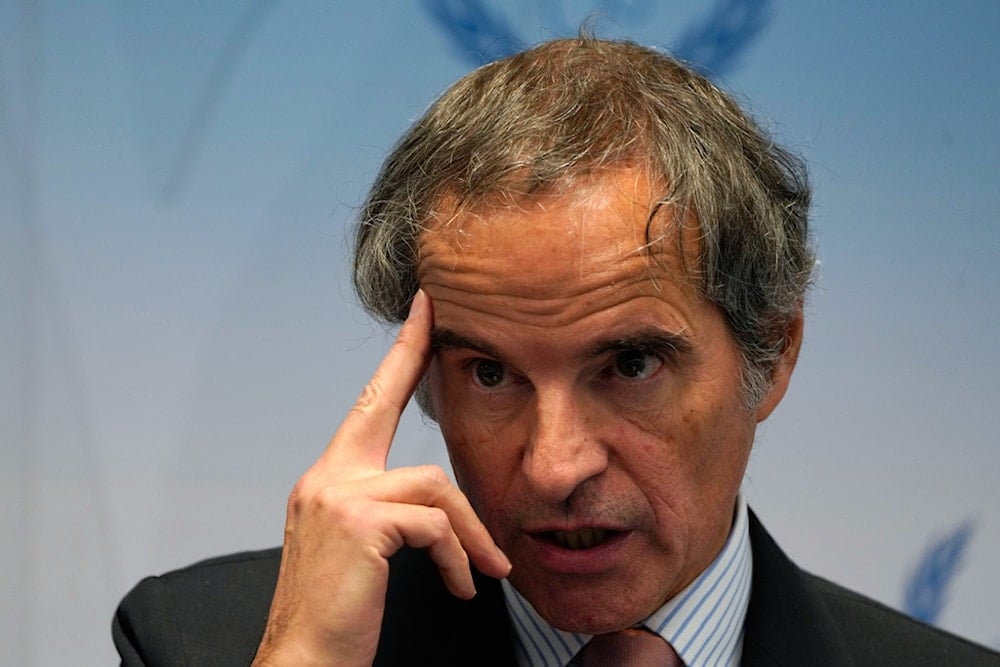Military strikes cannot end Iran's nuclear program: IAEA Chief
IAEA chief Rafael Grossi has declared that military force cannot dismantle Iran's nuclear program, as Tehran reviews a US request for renewed talks following a failed strike campaign and the suspension of nuclear inspections.
-

Rafael Mariano Grossi, the director-general of the International Atomic Energy Agency, speaks to journalists attending a weeklong seminar at the agency in Vienna, Austria, on May 28, 2025. (AP Photo/Jon Gambrell)
The head of the International Atomic Energy Agency (IAEA), Rafael Grossi, has categorically dismissed the notion that Iran's nuclear program can be dismantled through military means, calling such efforts both impractical and doomed to fail.
"Iran is a big country with a sizable economy, and a significant industrial potential and technical capabilities. None of these factors can be canceled by military means," Grossi told Poland's Rzeczpospolita in an interview published Wednesday, adding "The international community would consequently never resolve the nuclear issue through force."
His remarks follow the devastating 12-day war triggered by an Israeli attack on June 13, under the pretext of halting Iran's alleged nuclear weapons development. The United States joined the strikes on June 22, targeting key Iranian nuclear facilities.
In response, Iran, invoking its right to self-defense under international law, launched retaliatory missiles on Israeli and American positions, including a direct hit on the Al Udeid airbase in Qatar. A ceasefire was then immediately declared on June 23.
Controversial IAEA report and fallout
Tensions escalated in the lead-up to the strikes following a May 31 IAEA report that claimed Iran was in breach of its safeguards obligations under the Nuclear Non-Proliferation Treaty (NPT). Iranian officials blasted the report as politically motivated and accused the agency of paving the way for military aggression by releasing sensitive nuclear data that allegedly ended up in Israeli hands.
Grossi has pushed back against those claims, asserting the agency's neutrality. "The agency emphasized the absence of credible evidence proving Iran already possessed nuclear weapons," he clarified. While the report noted Iran's technical capacity to enrich uranium to high levels, he stressed, "This does not mean such knowledge has been or is being weaponized."
Nonetheless, fallout from the strikes has been severe. On July 4, the IAEA withdrew its last inspectors from Iran after Tehran suspended all cooperation, citing safety concerns and alleged collusion between the agency and Israeli intelligence. Grossi has since been barred from visiting Iranian nuclear sites or installing surveillance cameras, with Iranian lawmakers denouncing the IAEA as "Israel's protector and servant."
Read more: IAEA to be held accountable for pre-strike Iran assessments: Lavrov
Conditional diplomacy on the table
Despite the rupture in oversight, diplomatic backchannels have begun to stir. On July 8, Mehr News reported that Iran is reviewing a US request, relayed via Turkey and other intermediaries, to resume nuclear negotiations.
According to sources close to the Iranian Foreign Ministry, any future talks would need to address reparations for the strikes, full sanctions relief, and formal recognition of Iran's right to enrich uranium domestically.
Moreover, Foreign Minister Abbas Araghchi underscored that while Iran remains committed to the NPT, it demands guarantees against further acts of aggression. "The doors of diplomacy will never be closed," he said, but stressed that talks must be grounded in mutual respect, justice, and accountability.
Grossi, for his part, reiterated the urgency of restoring the agency's verification capabilities. "The inspection regime cannot afford further disruption," he warned. Yet even as he advocates for renewed cooperation, Grossi's admission that military action "cannot solve the nuclear issue" may complicate Western narratives seeking to justify force over diplomacy.

 3 Min Read
3 Min Read










